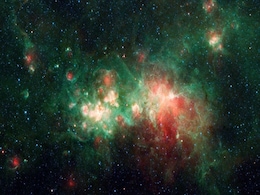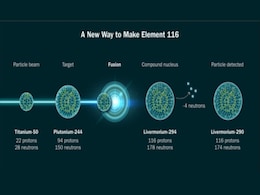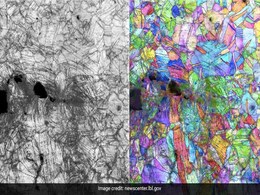Lawrence Berkeley National Laboratory
- All
- News
-

New Cosmic Surveys Reveal Unexpected Clues About Universe’s Evolution
- Monday February 3, 2025
- Written by Gadgets 360 Staff
A new study published in the Journal of Cosmology and Astroparticle Physics reveals a potential discrepancy in the expected clumpiness of cosmic structures. Researchers from the University of Pennsylvania and Lawrence Berkeley National Laboratory analysed data from the Atacama Cosmology Telescope (ACT) and the Dark Energy Spectroscopic Instrument (...
-
 www.gadgets360.com
www.gadgets360.com
-

Scientists Move Closer to Synthesising Element 120, Marking Potential New Era in Periodic Table
- Monday November 11, 2024
- Written by Gadgets 360 Staff
Scientists at Lawrence Berkeley National Laboratory in California are exploring new techniques for creating superheavy elements, focusing on the potential synthesis of “element 120,” also called unbinilium. If successful, this addition could lead to an eighth row on the periodic table. Using ion bombardment, researchers demonstrated a process t...
-
 www.gadgets360.com
www.gadgets360.com
-

Scientists Take Major Step Toward Creating Heaviest Element Ever
- Monday August 12, 2024
- Gadgets 360 Staff
At Lawrence Berkeley National Laboratory, scientists have achieved a significant milestone by creating livermorium with a novel titanium-based method. This success is seen as a precursor to synthesizing unbinilium, the heaviest element. The research highlights the importance of advancing techniques in element synthesis to explore new frontiers in a...
-
 www.gadgets360.com
www.gadgets360.com
-

Combination Of These Three Metals Is The Toughest Known Material On Earth
- Monday December 12, 2022
- Science | Edited by Anjali Thakur
The study was published by a team of scientists from Lawrence Berkeley National Laboratory (Berkeley Lab) and Oak Ridge National Laboratory, who described the findings as "record-breaking".
-
 www.ndtv.com
www.ndtv.com
-

Novel Material Powers The World's Smallest Transistor
- Friday October 7, 2016
- World News | Indo-Asian News Service
A research team led by US Department of Energy's Lawrence Berkeley National Laboratory has created the world's smallest transistor with a working one-nanometre gate.
-
 www.ndtv.com
www.ndtv.com
-

The World Is About To Install 700 Million Air Conditioners. Here's What That Means For The Climate
- Tuesday May 31, 2016
- World News | Chris Mooney, Brady Dennis, The Washington Post
As summer temperatures finally settle in, many in the U.S. take it for granted that they can dial down the thermostat: Americans use 5 percent of all of their electricity cooling homes and buildings. In many other countries, however - including countries in much hotter climates - air conditioning is still a relative rarity.
-
 www.ndtv.com
www.ndtv.com
-

Bacterium Trained To Perform Artificial Photosynthesis
- Saturday January 9, 2016
- Health | Press Trust of India
Scientists have successfully trained bacteria to perform photosynthesis - despite being non-photosynthetic, an advance that could lead to the next generation of solar-to-chemical conversion technologies.
-
 www.ndtv.com
www.ndtv.com
-

Now You See it, Now You Don't: Invisibility Cloak Nears Reality
- Friday September 18, 2015
- World News | Reuters
A cloak of invisibility may be common in science fiction but it is not so easy in the real world. New research suggests such a device may be moving closer to reality.
-
 www.ndtv.com
www.ndtv.com
-
Too Much Exercise Can be Dangerous
- Thursday August 14, 2014
- AFP
A study published in Mayo Clinic Proceedings and led by Paul Williams of the Lawrence Berkeley National Laboratory and Paul Thompson of the Department of Cardiology at Hartford Hospital, focused on 2,400 heart attack survivors and found that the more...
-
 food.ndtv.com
food.ndtv.com
-

New Cosmic Surveys Reveal Unexpected Clues About Universe’s Evolution
- Monday February 3, 2025
- Written by Gadgets 360 Staff
A new study published in the Journal of Cosmology and Astroparticle Physics reveals a potential discrepancy in the expected clumpiness of cosmic structures. Researchers from the University of Pennsylvania and Lawrence Berkeley National Laboratory analysed data from the Atacama Cosmology Telescope (ACT) and the Dark Energy Spectroscopic Instrument (...
-
 www.gadgets360.com
www.gadgets360.com
-

Scientists Move Closer to Synthesising Element 120, Marking Potential New Era in Periodic Table
- Monday November 11, 2024
- Written by Gadgets 360 Staff
Scientists at Lawrence Berkeley National Laboratory in California are exploring new techniques for creating superheavy elements, focusing on the potential synthesis of “element 120,” also called unbinilium. If successful, this addition could lead to an eighth row on the periodic table. Using ion bombardment, researchers demonstrated a process t...
-
 www.gadgets360.com
www.gadgets360.com
-

Scientists Take Major Step Toward Creating Heaviest Element Ever
- Monday August 12, 2024
- Gadgets 360 Staff
At Lawrence Berkeley National Laboratory, scientists have achieved a significant milestone by creating livermorium with a novel titanium-based method. This success is seen as a precursor to synthesizing unbinilium, the heaviest element. The research highlights the importance of advancing techniques in element synthesis to explore new frontiers in a...
-
 www.gadgets360.com
www.gadgets360.com
-

Combination Of These Three Metals Is The Toughest Known Material On Earth
- Monday December 12, 2022
- Science | Edited by Anjali Thakur
The study was published by a team of scientists from Lawrence Berkeley National Laboratory (Berkeley Lab) and Oak Ridge National Laboratory, who described the findings as "record-breaking".
-
 www.ndtv.com
www.ndtv.com
-

Novel Material Powers The World's Smallest Transistor
- Friday October 7, 2016
- World News | Indo-Asian News Service
A research team led by US Department of Energy's Lawrence Berkeley National Laboratory has created the world's smallest transistor with a working one-nanometre gate.
-
 www.ndtv.com
www.ndtv.com
-

The World Is About To Install 700 Million Air Conditioners. Here's What That Means For The Climate
- Tuesday May 31, 2016
- World News | Chris Mooney, Brady Dennis, The Washington Post
As summer temperatures finally settle in, many in the U.S. take it for granted that they can dial down the thermostat: Americans use 5 percent of all of their electricity cooling homes and buildings. In many other countries, however - including countries in much hotter climates - air conditioning is still a relative rarity.
-
 www.ndtv.com
www.ndtv.com
-

Bacterium Trained To Perform Artificial Photosynthesis
- Saturday January 9, 2016
- Health | Press Trust of India
Scientists have successfully trained bacteria to perform photosynthesis - despite being non-photosynthetic, an advance that could lead to the next generation of solar-to-chemical conversion technologies.
-
 www.ndtv.com
www.ndtv.com
-

Now You See it, Now You Don't: Invisibility Cloak Nears Reality
- Friday September 18, 2015
- World News | Reuters
A cloak of invisibility may be common in science fiction but it is not so easy in the real world. New research suggests such a device may be moving closer to reality.
-
 www.ndtv.com
www.ndtv.com
-
Too Much Exercise Can be Dangerous
- Thursday August 14, 2014
- AFP
A study published in Mayo Clinic Proceedings and led by Paul Williams of the Lawrence Berkeley National Laboratory and Paul Thompson of the Department of Cardiology at Hartford Hospital, focused on 2,400 heart attack survivors and found that the more...
-
 food.ndtv.com
food.ndtv.com










